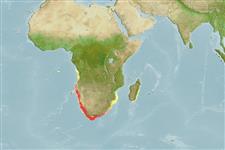Common names from other countries
(كوسه ها و سپرماهيان) (sharks and rays) >
Carcharhiniformes (Ground sharks) >
Pentanchidae (Deepwater catsharks)
Etymology: Holohalaelurus: holos (Gr.), whole or entire, i.e., being a form of Halaeurus without any labial folds or grooves in the mouth. (See ETYFish); regani: In honor of English ichthyologist Charles Tate Regan (1878-1943), Natural History Museum (London), who described many South African fishes. (See ETYFish).
Environment: milieu / climate zone / depth range / distribution range
بوم شناسي
دريايي موجوداتی که در اعماق زیر 200 متر زندگی و تغذیه می کنند; تغييرات عمق ? - 1075 m (Ref. 75585), usually 150 - 300 m (Ref. 75585). Deep-water; 4°S - 37°S
Indian Ocean from Durban, kwaZulu-Natal, South Africa, southwards and westwards to Cape Agulhas; westward into the Atlantic Ocean; northwards to southeast of Lüderitz, Namibia.
Size / Weight / سن
Maturity: Lm ? range ? - ? cm
Max length : 69.0 cm TL جنس نر / بدون خواص جنسي; (Ref. 5578)
توصيف مختصر
كليدهاي شناسايي | ريخت شناسي | ريخت ستجي بوسيله انداره گيري
خارهاي باله پشتي (کل) : 0; خارهاي باله مخرجي: 0. A broad-headed catshark with crowded dark brown spots on a yellowish background, producing a net-like pattern of light lines; underside white with small black pores; no labial furrows (Ref. 5578). Specimens less than 23 cm TL blackish with white side spots (Ref. 5578).
Found on the outer continental shelf and upper slope, on or near the bottom (Ref. 244). This species has been reported to prefer temperate to cool temperate waters, but may also be found in subtropical waters; apparently prefer 200-300 m depths on the west coast and 100-200 m depths on the south coast; and, a common by catch of demersal trawlers (Ref. 75585). Feeds mainly on pelagic bony fishes, also fish offal, hagfish eggs, crustaceans, and cephalopods (Ref. 5578). Oviparous (Ref. 50449).
Life cycle and mating behavior
Maturities | تولید مثل | Spawnings | Egg(s) | Fecundities | توزاد ( لارو)
Oviparous, with one egg laid per oviduct at a time (Ref. 5578). Embryos feed solely on yolk (Ref. 50449).
Compagno, L.J.V., 1984. FAO Species Catalogue. Vol. 4. Sharks of the world. An annotated and illustrated catalogue of shark species known to date. Part 2 - Carcharhiniformes. FAO Fish. Synop. 125(4/2):251-655. Rome: FAO. (Ref. 244)
وضعيت در فهرست قرمز IUCN (Ref. 130435)
CITES (Ref. 128078)
Not Evaluated
خطر برای انسان ها
Harmless
استفاده انسانی
ابزارها
گزارش های ويژه
بارگيری XML
منابع اينترنتي
Estimates based on models
Preferred temperature (Ref.
115969): 9 - 15.8, mean 10.5 (based on 54 cells).
Phylogenetic diversity index (Ref.
82804): PD
50 = 0.5312 [Uniqueness, from 0.5 = low to 2.0 = high].
Bayesian length-weight: a=0.00355 (0.00176 - 0.00714), b=3.09 (2.91 - 3.27), in cm Total Length, based on LWR estimates for this (Sub)family-body shape (Ref.
93245).
Trophic level (Ref.
69278): 4.2 ±0.5 se; based on diet studies.
جهندگی (Ref.
120179): پايين ، كم, كمينه زمان لازم براي دو برابر شدن جمعيت 5/4 – 14 سال (Fec assumed to be <100).
Fishing Vulnerability (Ref.
59153): Moderate to high vulnerability (48 of 100).
